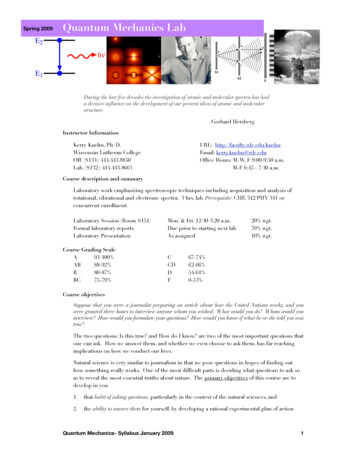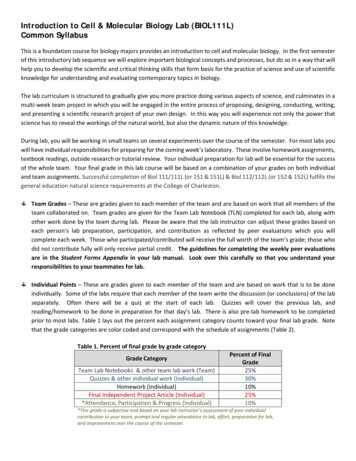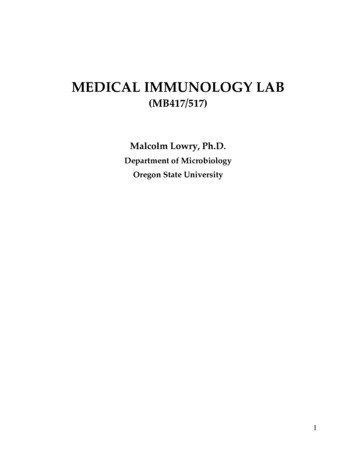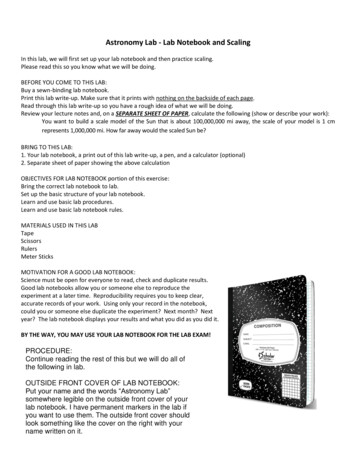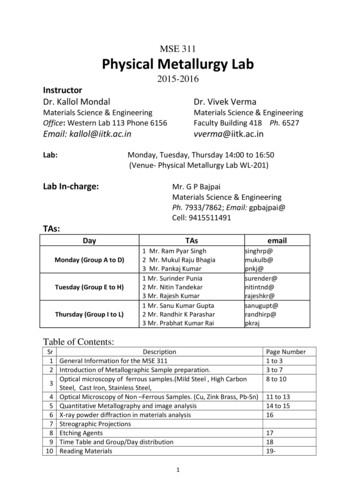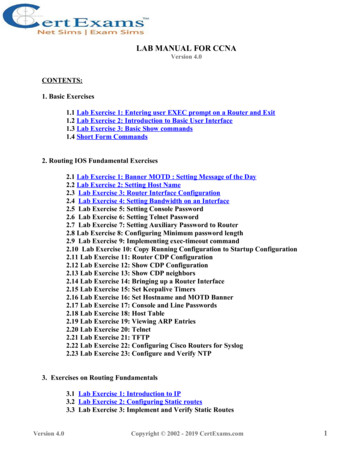
Transcription
MOLECULAR BIOPHYSICSGRADUATE PROGRAMFlorida State UniversityImage from the lab of Dr. Wei YangSTUDENTHANDBOOK2015-2016
Cover illustration courtesy of Dr. Wei Yang and Dr. Donald LD Caspar.The Yang lab in collaboration with Donald Caspar uses advanced simulation techniques to look atthe assembly mechanism of the coat proteins of the Tobacco Mosaic virus.2
MOLECULAR BIOPHYSICS GRADUATE PROGRAMFLORIDA STATE UNIVERSITYPHILOSOPHYThe Graduate Program in Molecular Biophysics is designed to transform an individual from student to professional scholar. Awarding of the degree signifies thatthe individual is qualified to join the community of scholars and is recognized as anauthority in the discipline. Graduate education is one of the most important missions of this program. Every effort is made to provide both financial and professional support for qualified graduate students. The goal of such support is to facilitate progress toward the degree while contributing to the teaching and researcheffort of the University.This handbook contains information useful to both graduate students and faculty.It is important to point out two significant and sometimes interactive features. Theyare rather standard academic practices and are not unique to our program:1.Generally, students complete the requirements in the MOB Student Handbook dated the year in which they enter the program, or those of any subsequent year’s Handbook, but may not combine requirements from differentyears except at the discretion of the MOB Program Committee, and then onlyfor sound academic reasons presented in advance. Continuing students whoare unsure of their requirements should consult the MOB Graduate Office.2.Students are expected to satisfy all requirements within the specified timelines, except when it is impossible to do so for reasons beyond their control.In such cases, which should be identified in advance, the MOB ProgramCommittee can exercise discretionary authority either to waive the requirement or to approve an extension or substitution.In addition to information in this booklet, the student should seek out informationfrom The Graduate School and “GradSpace”, which is their Blackboard site (signup at campus.fsu.edu — Organizations). The Graduate School provides an additional handbook for all University graduate students and is an excellent referencefor both students and faculty.3
Table of ContentsRequirements for the DegreeHow to Get There From HereI.Academic AdvisingII.Lab RotationsIII.Major ProfessorIV.Doctoral Supervisory CommitteeV.Program of StudiesVI.Annual ReviewsVII.Required CourseworkVIII.Teaching RequirementIX.Seminar RequirementX.Graduate Examinations (MOB 8964 & 8965)XI.Dissertation (MOB 6980)XII.Dissertation Defense (MOB 8985)and Graduation55566677788991011Financial InformationFunding, Paychecks, Assistantships PaperworkWaivers, Health Insurance Subsidy, Travel111112Other Helpful InformationMOB / IMB Website addressActivate Your FSUID, Get FSU ID CardBuilding Access / Keys to RoomsIMBPeople Email List, Desk AssignmentComputer Access & WiFiHealth Info, Counseling Services and Health InsuranceCenter for Global EngagementDrop/Add, Athletic and Recreation FacilitiesAcademic Probation,Conflict Resolution, Getting In-State ResidencyOrdering Transcripts131313131314141414151515MOB Faculty Directory2015-2016 Calendar and Rotation Schedule1618Quick List of ExpectationsInside Back Cover4
REQUIREMENTS FOR THE DEGREEStudents with very different backgrounds in the sciences are admitted to the MOBGraduate Program and some may need to take additional courses to provide anadequate background for graduate training. A minimum of one semester each ofbiochemistry and physical chemistry is strongly recommended. You must also complete a series of graduate core courses and an additional nine hours of electivecourses. The overall requirements for the Ph.D. degree are:1) Complete the course requirements (see Section VII, page 7).2) After rotating through at least 3 labs, select an advisor with whom who youwould like to pursue your research project and discuss with MOB Director.3) Teach at least one semester.4) Attend a seminar series each Fall and Spring semester throughout yourgraduate career, and present at least one seminar each year in the program.5) Successfully complete the written and oral components of the preliminarydoctoral examination.6) Successfully present and defend a doctoral research proposal (prospectusexamination) approved by your Major Professor and Doctoral SupervisoryCommittee to advance to candidacy.7) Complete a minimum of 24 semester hours of dissertation credit afteradmission to doctoral candidacy;8) Submit, publicly present, and successfully defend a dissertation;9) Note: The University requires that your degree be completed within fivecalendar years from the time you are admitted to candidacy. You mustmake an official request to extend the completion time.NOTE: It is your responsibility to make sure all steps are complete and thatsteady progress is being made.HOW TO GET THERE FROM HERENOTE: Learn about “my.FSU.edu” and “Blackboard”. Many transactions at FSU areconducted through these sites. Most of the forms you will need are available in theMOB Organization section of Bb and on our website www.biophysics.fsu.edu — Contacts & Forms.I.ACADEMIC ADVISINGFirst year students meet with the MOB Director soon after arrival for a general MOBwelcome and orientation. The MOB Coordinator can assist with advising students intheir second and third semesters. At the end of the second semester, the student determines the lab he or she wants to join. After the professor has agreed, advising will behandled by the major professor and supervisory committee .A first semester resembles this: Laboratory rotations (MOB5905-1) Usually 1 core course and 1 elective Structural Biology/Biochem SeminarA second semester resembles this: Laboratory rotations (MOB5905-1) Usually 1 core course and 1 elective Structural Biology/Biochem Seminar Responsible Conduct in Research5
II. ROTATIONSFirst year students are required to complete at least three lab rotations with MOBfaculty to aid in the selection of a Major Professor.Early in the semester, attend Research Talks by MOB Faculty in their home department to get information about their labs. During the first 2 weeks of your first semestermeet with six to eight professors from the MOB faculty to discuss their research andthe possibility of doing a lab rotation under their supervision. After these interviewsselect the labs in which you will rotate.Your MOB Lab Rotation Interview Form should be submitted to the MOB Coordinator by the end of the second week of classes for approval by the MOBProgram Director. If you are uncertain about the last rotation contact the MOBCoordinator for guidance.Rotations last approximately 6 weeks, and should be completed by the end of thesecond semester in the Program. A fourth optional rotation may be done if a studenthas not found a major professor after the initial rotations. Register for MOB 5905D.I.S. – Rotation. See the current year schedule at the end of the Handbook.III.MAJOR PROFESSORAt the end of Rotations and by the end of the second semester, you must select aMajor Professor and have the professor notify the MOB Coordinator by memo ore-mail that he or she agrees to serve as your advisor.IV. DOCTORAL SUPERVISORY COMMITTEEDuring the third semester (typically the Summer of your first year), you will contact faculty members to serve on your Doctoral Supervisory Committee and submit thesigned Doctoral Supervisory Committee form to the MOB Coordinator.A. Committee composition (five faculty total):1.2.3.4.5.6.Major Professor;At least two, but no more than three other MOB faculty members;One member is the University Representative, who must be tenured withGraduate Faculty status and not a member of the MOB faculty.Three of the other four members must hold Graduate Faculty Status; onemember may hold Co-Doctoral Status if both the Major Professor and MOBProgram Director are in agreement regarding this member.One member (not your major professor) is selected to be the Chair of thecommittee;Your choice of Major Professor and Supervisory Committee members mustbe approved by the MOB Graduate Program.B. Your Committee is responsible for:1. Guiding your research program in adherence to University and MOB policiesand procedures;2. Establishing your Program of Studies for MOB Program Committee approval(see p. 7);3. Reviewing your progress and completing a progress report (Annual Reviewform) by April 30th of each year;4. Administering your Preliminary Doctoral Exam and Thesis Prospectus Defense and notifying the MOB Graduate Office by memo or e-mail of the results(Pass/Incomplete/Fail);5. Functioning as the examining committee for your dissertation defense.6
You should assemble your committee as early as possible to discuss and establishyour Program of Studies, set the date for Comprehensive Exams, and determine thetimeline for fulfilling the teaching requirement.V.PROGRAM OF STUDIESYour Program of Studies is tailored to meet your individual needs and lists all necessary courses you have taken and intend to take to ensure competence in the area ofresearch involved, including elective courses. By the end of the third term inresidence, you must prepare the Program of Studies form in consultation with yourMajor Professor and Doctoral Supervisory Committee. The form is then submitted,with appropriate signatures, to the MOB Program Committee for approval. The approved Program of Studies form will be kept in your permanent file in the MOB Graduate Office and a copy returned to you.Regarding coursework waivers and deadlines, it is important to note that your MajorProfessor and Committee can recommend by memo to the MOB Graduate Committee that a particular requirement (e.g., teaching) has been satisfied. However, theyare not authorized to waive a requirement, nor to postpone a deadline. That decision is made by the MOB Program Committee.VI. ANNUAL REVIEWSThe University requires all graduate students to be evaluated annually. A completedProgress Report is electronically submitted to the Graduate School and a record iskept in a student’s permanent file. The first year review is conducted by the MOBProgram Committee at the end of the second semester in residence.In subsequent years, annual reviews are carried out by the student’s supervisorycommittee. Comments are solicited from the student’s advisor and following thecommittee meeting, the committee chair will provide a brief summary. It is your responsibility to arrange the meeting with your Committee to discuss progress, andmake sure the completed and signed form is returned to the MOB Coordinator byApril 30th for entry into your permanent file. Any delay to this schedule must be approved by the MOB Program Director.VII. REQUIRED COURSESA. MOB 5905 D.I.S. – (Major Prof) Beginning with the summer of your first year,this course (Directed Individual Study) accounts for the time you will spend inyour Major Professor’s lab until you pass both the Preliminary Doctoral Examand the Thesis Prospectus Defense. Variable credit hours as needed.B. If there is the need for the incoming student to take a background course inbiochemistry or physical chemistry these courses can be taken on a pass/failbasis.C. You must complete a series of graduate core courses consisting of:BCH 5505BCH 5745PSB 5077PCB 5137Structure and Function of EnzymesChemical and Physical Characterization of BiopolymersResponsible Conduct of Research (Spring)Advanced Cell Biology (Spring)D. You must complete a minimum of nine additional hours of graded electivecoursework. These courses are selected by you in consultation with your MajorProfessor and Doctoral Supervisory Committee, and listed on your Program ofStudies. The courses must be directly associated with progress towards yourdegree program, and can be selected from among those offered in Chemistry,Biology, Neuroscience, Math, Engineering, Physics and others.7
VIII. TEACHING REQUIREMENTThis requirement is typically fulfilled during the second year in the program in orderfor you concentrate on completing coursework and choosing a research area duringyour first year and on dissertation research in later years.A.You must teach at least three contact hours a week for one semester, typically in the home department of your Major Professor. A grading assignmentcannot substitute for this requirement.B.The SPEAK (Speaking Proficiency English Assessment Kit) test evaluatesEnglish speaking ability of non-native speakers. It is a locally administeredtest given once each semester. A score of 50 or higher is required to teach.Students who score lower must take classes in spoken English (offeredthrough the FSU Center for Intensive English Studies) each semester untilthey score 50. Students may be able to initially teach a lab with a score of 45,but must take English classes concurrently until they achieve a 50 or passthe EAP4831 course with a score of 90. Students usually teach during theirsecond year in the program, so should pass this test by the end of the firstyear. The requirement is waived with a score of 26 or higher on the spokenportion of the IBTOEFL.C.To teach in Chemistry or Biology you must enroll in the appropriate departmental class for Teaching Assistants (TAs). These classes are generally allday classes held during the week before Fall classes begin. Future Chemistry Department TAs register for CHM 5945 for Fall term of their 2nd year.Biology Dept. TAs attend a similar class, but do not formally register for it.Contact the Biology representative at gradinfo@bio.fsu.edu to indicate yourintention to take the Biology class.D.Notify the MOB Coordinator as soon as you know which semester you intendto teach. We must contact the Chemistry and Biology Departments to determine if they have TAs available.E.After you fulfill the teaching requirement complete the Teaching Certificationform available on the MOB Blackboard site. This will be added to yourpermanent electronic file. If you have documented previous teaching experience and your major professor and committee do not require you to teach, arequest to waive the teaching requirement can be submitted. The finaldecision rests with the discretion of the MOB Program Committee.IX. SEMINAR REQUIREMENTYou must register for and attend the Structural Biology/Biochemistry Seminar inboth Fall and Spring every year of your graduate career.You must present a minimum of one seminar every year. During the first twoyears, this presentation is made in the “Students for the Effective Communicationof Science” (SECS) seminar series, which is student-organized and ungraded.(Although you do not register for the SECS series, MOB students are expected toattend each week.) Each subsequent year, the presentation is made by registering for the graded Structural Biology/Biochemistry seminar (BCH6896-lettergrade) the term you are scheduled to present. Notify the MOB Coordinator ofyour seminar title.During the terms you do not present a graded seminar, you must register forungraded seminar (BCH 6897-S/U)EXCEPTION: The year in which you present your Preliminary Examination,Thesis Prospectus Defense and Dissertation Defense, you may enroll in ungradedseminar both terms.8
X. GRADUATE EXAMINATIONSThere are two parts of the MOB Graduate Examinations and registration is through MOB8964 and MOB 8965. After completing both exams successfully, students are admitted tocandidacy. An Admission to Candidacy form is signed by the Director of the MOB Programand submitted by the MOB Academic Coordinator to the College of Arts and Sciences andthe Registrar.When the student has completed each exam, the Chair of the Doctoral SupervisoryCommittee must notify the MOB Coordinator by memo or e-mail.A. Preliminary Doctoral Exam (Written and Oral Components)This exam is normally completed during the spring semester of the second year in residence. Students meet with their Supervisory Committee to plan the exam schedule; theCommittee determines the content and format of the exam, which usually consists ofsets of questions from individual members of the committee. The student answers oneset each week for 4 to 5 weeks. Answers are evaluated by the committee and an oraldefense of the answers is held 2-3 weeks after all answers have been submitted. Following the successful oral defense the Prelim Exam Approval Form (signed by all committee members) is submitted to the MOB Coordinator.B. Thesis Prospectus Defense(Students register for both MOB 8964 - 0 hrs and MOB 8965 - 0 hrs the semesterthey present their Prospectus Defense)The exam consists of a written formal grant proposal, or prospectus, in the NIH or NSFformat, describing preliminary results and proposed experiments. Students are expectedto complete this requirement within 6 months to one year after successfully completingthe preliminary exam.The prospectus is submitted to the Doctoral Supervisory Committee for evaluation atleast two weeks in advance of the oral presentation. This is scheduled as a public seminar and the MOB Coordinator needs to be notified of the title, date, time, and locationtwo weeks before the event so appropriate advertisement can be done. MOB studentsare required to hold their presentation in KLB 112, unless they have secured the agreement of the IMB Director or the MOB Director to meet elsewhere.After the public presentation, the student is challenged by the Committee in a closedsession to offer an oral defense of the prospectus. Following the successful defense theDissertation Prospectus Approval Form (signed by all committee members) is submittedto the MOB Coordinator. The student also prepares the Admission to Candidacy formwhich is signed by the Program Director and then submitted to the MOB Coordinator.Note: The grades for these courses are P (pass), I (incomplete) or F (fail) – not S/U. If astudent does not complete the exam during the term in which he or she registered for it,an incomplete grade is given. MOB 8964 and 8965 will then be dropped from that semester and the student will register again in the semester that the exam is passed.The MOB Program Committee may extend the deadlines for completing these exams onan individual basis upon written request describing the reasons for the delay.XI.DISSERTATION HOURS(MOB 6980 1-12 hrs. per semester, min. of 24 hrs. required)After being admitted to candidacy you will eligible to register for Dissertation hours instead of DIS hours. University policy requires a minimum of 24 hours of Dissertationbefore you can graduate. Up to a certain point in the semester you are allowed toswitch from DIS to Dissertation hours after being admitted to candidacy.9
XII. DISSERTATION DEFENSE and GRADUATIONDissertation Defense consists of a public seminar presenting your dissertation researchand a subsequent oral examination administered by your Doctoral Supervisory Committee.A.Register for MOB 8985 (0 hrs.) with your major professor as the instructor of record.Notify the MOB Coordinator the semester before you expect to graduate so a coursecan be created for you. You must be registered in the final term in which your dissertation is completed. If you are receiving your stipend you will register as a full time student. If not, you may be able to register for fewer hours.B.Know your dates and deadlines. The Graduate School publishes specific timelinesfor each semester (BlackBoard/GradSpace/Manuscript Clearance). Find all necessaryforms through this link, including the “Dissertation Forms Checklist”. Call 644-0045 ifyou aren’t sure about anything.C.Apply for graduation online during the 3 week window at the start of each semester.(Login at my.fsu.edu - from the “my academics” tab select “more ”, then Apply forGraduation.) This starts the graduation process and is in addition to registering forDissertation Defense (MOB 8985).D.Set your date, which should be in plenty of time to meet all deadlines. Make sure allof your committee members will be present for your defense; you may need to replacemembers who are not available on that date.Program Policy: All committee members and the student must attend the entiredefense in real time, either by being physically present or participating via distancetechnology. The committee must all agree to this latter participation method.E.Submit the Defense Announcement form online 2 weeks prior to your defense.F.Notify the MOB Coordinator of the title, date, time, and location of your defense sonotices can be posted in the appropriate buildings and via e-mail.G.Submit your initial manuscript electronically to Manuscript Clearance beforedefense for “Initial Format Review.” See the date deadline on the Manuscript Clearance website.H.Provide a copy to each member of the supervisory committee a minimum of twoweeks before the date of your defense. Check with each member to determine whether they prefer to receive their copy earlier than this time frame. The university recommends 4 weeks in advance of the defense.I.International students must submit a “Final Term Form” to the Center for GlobalEngagement. This is signed by the MOB Coordinator as the Academic Advisor.J.Take these forms to your defense:“Manuscript Signature Form”“University Representative Doctoral Defense Report”“Final Degree Clearance Form”(Find forms on “Blackboard/GradSpace/Manuscript Clearance/Forms”).(Note—all forms are due to Manuscript Clearance Office, 3rd floor of Westcott, by 5 pmon the day of the Final Manuscript Submission Deadline. This includes the Univ. Rep.report so if you are cutting it close have the Coordinator be involved in submitting allthe documents. In this case, don’t rely on the Univ. Rep. to get their report in on time.)K.The “Manuscript Signature Form” is typically signed by the members of your Committee immediately after a successful defense. A member of the committee shouldsubmit the original, signed copy to the MOB Coordinator, who will forward it to theGraduate School (Rm. 314 Westcott) in a sealed envelope or hand deliver if time is ofthe essence. The student should not handle this form after it is signed.10
L.The original, signed copy of the “University Representative Doctoral DefenseReport Form” should be submitted by the Univ. Rep. to the Manuscript ClearanceAdvisor in the Graduate School (314 Westcott) within one week after the defense.He or she also submits a copy to the College of Arts & Sciences. The MOB Coordinator can submit this form at the request of the University Representative.M.Submit the final manuscript electronically to Manuscript Clearance for finalclearance. After final clearance, provide a disk copy or email a pdf to the MOB Coordinator. While bound copies are no longer required we would be very pleased toinclude yours in the MOB dissertation library if you choose to provide one.N.Review the Dissertation Forms Checklist and make sure you have completed allrequired online surveys.O.The original, signed “Final Degree Clearance Form” is taken by the student tothe College of Arts and Sciences (in Longmire Bldg.) for signature, and thendropped off at the Graduate School Manuscript Clearance (Rm. 314 Westcott Bldg.644-0045). After assuring that all requirements have been met, the form will be forwarded to A&S and the Registrar for inclusion in the student’s permanent file.P.Congratulations!FINAL NOTES ON GRADUATIONA. All forms and clearance procedures must be completed within 60 days ofthe date of your defense, or you will have to re-defend and start the processover. There are NO EXCEPTIONS.B. If you will not complete your defense during the semester for which you applied,you must self-delete from that semester’s graduation list by contacting the Registrar’s Office. You will have an “Incomplete” for MOB 8985 which will be changedwhen you Pass. Do not re-register for this class.C. If you previously filed for your diploma but did not receive the degree, the application procedure must be repeated and you will be assessed a reapplication fee tocover diploma processing costs.FINANCIAL INFORMATIONI. BASIC INFORMATION ABOUT YOUR FUNDING: MOB students are completelysupported by the MOB Program for the first two semesters of their first year. Support insubsequent semesters is paid from the grant funds of the Major Professor or from afellowship, e.g., American Heart Association. The Major Professor may require thestudent to teach if a TA position is available from the professor’s home department.Securing funding for the student after the first 2 semesters is the responsibility of theMajor Professor.PAYDAYS are bi-weekly on Fridays. All FSU personnel are required to have pay deposited directly into a bank account specified by you. There is no option to be issued apaper paycheck.PAYCHECKS: New students should be aware that processing initial paperwork andgetting on the payroll could take several weeks. Retroactive pay for the period workedwill be included in the first paycheck. Because of possible delays in your initial appointment, be prepared to cover four to six weeks of expenses, including fees.11
II. SETTING UP YOUR RESEARCH ASSISTANTSHIP1. Domestic Students: After arriving in Tallahassee, check in with the MOB Coordinator tocomplete appointment paperwork. Be sure to bring your social security card and driver’slicense or other government issued photo ID.2. International Students: The very first place on campus to visit is the Center for GlobalEngagement (formerly known as The International Center) at 110 S. Woodward Ave., 850644-1702. They will advise you on the procedures to follow to get a US social security cardand health insurance. Afterward, check in with the MOB Coordinator to complete appointment paperwork. Be sure to bring your visa, I-94, I-20, and the letter you will receive fromthe US Social Security Office when you apply for a social security number.III.WAIVERS1.Matriculation (Tuition) WaiversAll full-time students are eligible for a waiver of most of their matriculation fees. Youare responsible for activity, transportation, athletic, health fees, etc. These fees coversuch things as access to recreation facilities, student parking permits, riding FSU andall city buses, access to Thagard Wellness Center, all without additional payment.2.Out-of-State Tuition Waiversa.All full-time international students are eligible for a waiver of most of the out-ofstate tuition fees.b.Domestic students who are non-Florida residents are eligible for an out-of-statewaiver for one year only. If you do not file for and receive Florida residencystatus, you will be responsible for 100% of out-of-state fees.3.Waiver ScheduleThe MOB Coordinator processes tuition waivers. You must register for a full courseload (9 to 12 hours, determined each semester by the Dean of the College of Arts andSciences) before the waiver can be initiated. You will be notified of the number ofhours for which you should register.4.Signature RequiredYou must sign a waiver receipt each term, acknowledging that you understand andaccept the conditions associated with the tuition waiver.Waivers will not be issued for any courses not applicable toward your Program ofStudies, undergraduate courses not required by the Ph.D. program, or any coursesdropped or added after the fourth day of class without the approval of the MOB Program Director.IV.HEALTH INSURANCE SUBSIDYThe Graduate School offers a health insurance reimbursement to students who selectone of the FSU sponsored insurance plans. Please refer to their website for moreinformation Insurance). In additionto The Graduate School contribution, the MOB Graduate Program provides a partialreimbursement for the remainder of the premium, contingent on available funds. Submit your receipt to the MOB Coordinator when requested. (Also see p. 14 for moreinformation on Health Insurance requirements.)V.FUNDING FOR STUDENT TRAVEL1. MOB Travel Policies:MOB students typically receive a Professional Development Allowance of 2000 foruse in the first two years in the graduate program. This amount has varied over theyears and is set annually by the MOB Director. Examples of professional development activities are attendance at scientific conferences or workshops.12
Beginning with the third year, students who travel to present research conducted atFSU on which they are first author are eligible for up to 600 each year, dependingon the availability of funds. If funds become limited, priority will be given to studentswho did not use the travel award the previous year. This money does not roll over tothe next year. Additional travel assistance for graduate students is available throughthe FSU Congress of Graduate Students (COGS).2. MOB Travel Procedures: KNOW THE RULES & PLAN EARLYAt least 5 working days before travel begins, submit a Travel Worksheet to the MOBCoordinator (MOB Blackboard site/Documents/Forms). A Travel Authorization (TAuth) must be processed before you leave on the trip. To receive a cash advance,submit paperwork 25 days in advance.Read the Travel Brochure available in on the website under Contacts & Forms.“Everything You Always Wanted to Know About Travel but Were Afraid to Ask”THE MOB / IMB WEBSITE: www.biophysics.fsu.eduOTHER HELPFUL INFORMATIONACTIVATE YOUR FSUIDYour FSUID provides access to many of the administrative services on campus throughmy.fsu.edu. This portal allows access to Blackboard and other interfaces for classes,registering, department and FSU information as well as OMNI (Personnel and Financials).Go to http://dos.fsu.edu/newnole/ for instructions on activating your ID and getting yourFSU email address.FSU ID CARDThis is the official photo identification card for FSU. Take your FSU issued “EMPLID”, anddriver’s license or passport to the FSU Card Center located near the FSU Bookstore.
handled by the major professor and supervisory committee . A second semester resembles this: Laboratory rotations (MOB5905 -1) Usually 1 core course and 1 elective Structural Biology/Biochem SeminarStructural Biology/Biochem Seminar Responsible Conduct in Research A first semester resembles this: -1)


